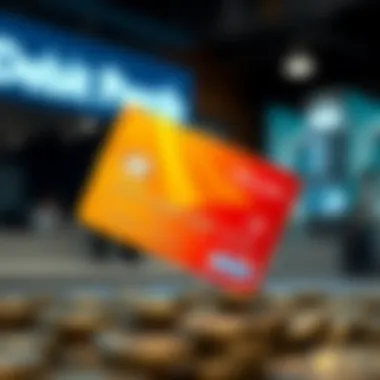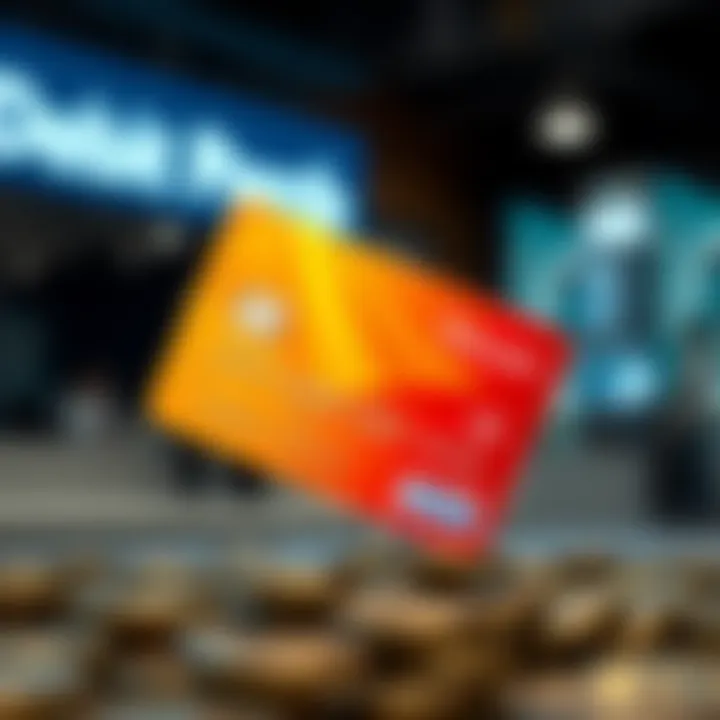Debit Card Compatibility with Cash App Explained


Intro
Navigating the world of digital finance can sometimes feel like stepping into a maze, especially when it comes to compatibility between various tools and services. Cash App, a popular financial platform, enables users to seamlessly send and receive money, make payments, and even invest in stocks or Bitcoin. However, understanding which debit cards function smoothly with Cash App is crucial for optimizing its use.
This article endeavors to clarify the existing relationship between Cash App and diverse debit card providers, demystifying the intricacies of integration, security features, and overall user experiences. By shedding light on these aspects, readers will find themselves better equipped to make prudent choices about their debit card usage in conjunction with Cash App.
Investment Terminology Breakdown
In this fast-paced financial landscape, it's essential to grasp certain key phrases. Let's break down some fundamental terms related to debit cards and their functionality with Cash App.
Key Terms Explained
- Debit Card: A payment card that deducts money directly from a consumer's checking account. It's a straightforward way to access funds without going into debt.
- Cash App: A digital wallet and payment service that allows users to send and receive money, invest in stocks, and buy Bitcoin with ease.
- ACH Transfers: Automated Clearing House transactions are electronic payments or deposits made between banks, often used for direct deposits and bill payments. The compatibility of a debit card with Cash App might involve these transfers during linking.
- Two-Factor Authentication: A security measure that requires two forms of identification before granting access, enhancing safety when dealing with financial tools like Cash App.
Common Misconceptions in Investing
It’s not uncommon to find confusion surrounding aspects of debit card use linked to Cash App. Here are a few myths unraveled:
- Myth: All debit cards work equally well with Cash App.
Reality: Not all debit cards are compatible; some may have restrictions or require additional steps for linking. It's always best to check Cash App's guidelines for specific card providers. - Myth: Using a debit card with Cash App incurs high fees.
Reality: Many debit cards can link to Cash App without additional charges, but this can vary based on the issuing bank. It's wise to read the fine print. - Myth: Cash App is only for money transfers.
Reality: Beyond sending money, Cash App offers investment options and even allows users to set up direct deposits.
Financial Product Reviews
To get the most bang for your buck, users must consider which debit cards not only sync well with Cash App but also provide beneficial features.
In-Depth Product Analysis
Here’s a closer look at some debit card options:
- Chime Visa Debit Card: Known for its integration capabilities with Cash App and no monthly fees, Chime offers an excellent choice for budget-conscious users.
- Bank of America Debit Card: While it's widely accepted, users should be mindful of possible user fees when transferring funds through Cash App depending on their account type.
- Discover Cashback Debit Card: Offers cashback on purchases but comes with specific linking requirements that can make it cumbersome for some Cash App users.
Pros and Cons of Each Offering
Here's a streamlined overview of the benefits and challenges associated with some popular debit card choices:
- Chime Visa Debit Card
- Bank of America Debit Card
- Discover Cashback Debit Card
Pros: Fee-free transactions, excellent integration with Cash App
Cons: Limited ATM access
Pros: Broad acceptance and familiarity
Cons: Potential fees depending on account type
Pros: Cashback rewards on purchases
Cons: Complicated linking process for Cash App users
This breakdown helps illustrate the different choices available, weighing their advantages and disadvantages for potential users of Cash App. For deeper insights on investment terms and tips, further resources like Investopedia or NerdWallet can provide valuable information.
Prologue to Cash App and Debit Card Functionality
In today’s rapidly evolving financial landscape, digital platforms like Cash App have become significant players, altering the way individuals conduct transactions. Understanding the intersection between Cash App and debit cards is crucial for users who desire both convenience and control over their finances. Cash App serves as a tool for seamless money transfer, investment, and payment processing, linking directly with users' financial accounts. This intersection highlights not only the flexibility of using debit cards with Cash App but also the potential pitfalls and precautions users should be aware of.
Overview of Cash App
Cash App, developed by Square, Inc., has gained traction for its user-friendly interface and broad array of functionalities. It allows users to send money to friends, pay bills, and even invest in stocks or Bitcoin. Moreover, it incorporates a Cash Card, a customizable debit card that facilitates transactions directly from the user's Cash App balance. This makes Cash App an attractive option for those who frequently transfer money or need instant access to their balance. Moreover, the platform's simplicity and accessibility are strong suits, making it appealing for anyone from tech-savvy millennials to less experienced users.
Regardless of their familiarity with financial technologies, users often find that having access to their funds with a debit card tied to Cash App not only streamlines transactions but also places them in the driver’s seat when it comes to managing expenses.
Functionality of Debit Cards
Debit cards, serving as a link between the user's bank account and the digital financial world, bring a practicality to Cash App's functionalities. When one links a debit card to Cash App, all transactions draw directly from the bank account associated with that card. This eliminates the risk of overspending that some may experience with credit cards, supporting a more disciplined approach to budgeting.
Functionality-wise, these cards must possess certain features to work well with Cash App. Key aspects include:
- Immediate Funds Access: Users can access their Cash App balance or linked bank account instantly, enabling them to make purchases without delays.
- Security Features: Many debit cards come with features like fraud alerts and instant transaction notifications. This promotes a heightened sense of security, essential in today’s digital age.
- Wide Acceptance: Most debit cards linked with Cash App can be used broadly, whether online or at physical stores, making them incredibly versatile for varied purchasing needs.


"Being able to access my funds instantly while using Cash App makes managing my expenditures simple and effective. The assurance that I won't overspend is a real comfort."
In essence, the functionality of debit cards within Cash App creates a blended experience, combining technology with practicality, which allows users to navigate their financial journeys more efficiently and securely.
Criteria for Debit Card Compatibility with Cash App
Understanding which debit cards work with Cash App is vital for managing your finances efficiently. As the financial landscape continues to adapt to technological innovations, the integration of debit cards with mobile applications, such as Cash App, is essential. In this section, we will discuss the key criteria that make a debit card compatible with Cash App, enabling users to make informed decisions and avoid potential pitfalls.
Essential Features Required
When looking for a debit card that can be seamlessly integrated with Cash App, certain features are indispensable. First, the card must be issued by a bank or credit union that partners with Cash App. This is essential as it ensures that transactions can be processed quickly and securely.
Secondly, the card should support instant transfers. Not all debit cards offer this functionality, but it is crucial for users looking to make immediate payments or transfers. Instant transfers enable accessibility and flexibility, features that users have come to expect from modern financial tools.
Furthermore, two-factor authentication (2FA) is an increasingly important feature. While not every card might support 2FA directly, having it enabled on your Cash App account adds a layer of security during transactions. Users can easily check their cash flow on-demand, giving them peace of mind. In summary, the essential features needed for compatibility with Cash App include:
- Issued by a partnered bank or credit union.
- Support for instant transfers.
- Enhanced security features, such as two-factor authentication.
Supported Networks
Next, it is pivotal to consider the networks that debit cards rely on. Cash App primarily supports cards that operate on popular debit card networks, such as Visa and Mastercard. Transactions from these networks are usually processed swiftly, which reinforces the reliability of the application for users.
In addition, it’s worthwhile to keep an eye on upcoming networks. For instance, if Cash App extends compatibility to lesser-known networks, it could broaden the scope of options available for users who want to leverage their banking arrangements. As the financial ecosystem evolves, keeping abreast of which networks are accepted can impact user choices significantly.
To sum it up, the successful use of a debit card with Cash App hinges on a few decisions that concern both features and the networks supported. While the technology behind Cash App is robust, understanding these criteria will arm users with the knowledge to select the best debit card that fits their lifestyle and financial needs.
List of Debit Cards That Work with Cash App
Navigating the landscape of debit cards that work with Cash App can be daunting, yet it is crucial for users looking to optimize their digital financial transactions. Understanding which debit card options are compatible with Cash App not only facilitates seamless transactions but also enhances user experience. With multiple options available in the market, it’s important to delve into the various institutions that offer these cards. Knowing the right debit card can save users both time and frustration while ensuring they can use Cash App’s features to the fullest.
Major Banks and Their Debit Cards
When it comes to well-established institutions, major banks tend to be a go-to for many users. Banks such as Chase, Bank of America, and Wells Fargo have been long trusted in the financial sector.
- Chase Debit Card: Linked to a traditional checking account, this card provides easy access to funds and is known for its reliability.
- Bank of America Debit Card: This card is versatile and integrates well with Cash App, allowing users to make purchases directly from their account balance.
- Wells Fargo Debit Card: This card enhances user convenience with features like zero liability for unauthorized transactions.
These banks typically offer robust online support and mobile app interfaces, supplementing the experience of using their debit cards with Cash App.
Credit Unions and Their Offerings
Credit unions often provide a unique advantage compared to large banks. They prioritize member service, often providing lower fees and higher interest rates on deposits. Some notable examples include:
- Navy Federal Credit Union: Members gain access to a debit card that works hand in hand with Cash App, easing direct transactions.
- Alliant Credit Union: Known for its competitive rates and no monthly fees on some accounts, this card is also compatible with Cash App, making it ideal for individuals wanting to manage their finances efficiently.
- America First Credit Union: This union offers a debit card that not only works with Cash App but also emphasizes user security and financial education.
Utilizing a credit union’s debit card with Cash App can lead to enhanced customer satisfaction, given their personalized service approach.
Challenger Banks and Digital Solutions
Challenger banks are rapidly gaining traction in today’s financial arena with their user-friendly interfaces and innovation in banking solutions. Options like Chime, Varo, and Current stand out in the digital space.
- Chime Debit Card: With no monthly fees, this card connects seamlessly with Cash App. Chime also offers early direct deposit, which many users find valuable.
- Varo Bank Debit Card: Known for its budgeting features, the app allows users to track spending while using Cash App for convenient payments.
- Current Debit Card: A newer player, Current is popular for its customizable features and instant notifications, ensuring users remain vigilant about their spending while using Cash App.
These challenger banks tend to offer unique perks, further enriching the user experience when combined with Cash App.
By understanding the different debit card options available, users can choose a payment method that aligns with their financial needs and preferences.
Whether you opt for traditional banks, credit unions, or digital solutions, knowing what's compatible with Cash App makes your financial exchanges smoother and more secure.
Setting Up a Debit Card with Cash App
Setting up a debit card with Cash App is more than just a formality; it’s a step towards streamlined financial management. By linking a debit card to your Cash App account, you enhance your ability to send and receive money, shop online, and manage your expenses effectively. The process is not overbearingly complicated but requires a few careful moves to ensure you're set up correctly and securely. Moreover, having a debit card connected to your Cash App account allows for quicker transactions, reduces the hassle of transferring funds between accounts, and adds a layer of convenience for everyday purchases.


Step-by-Step Setup Process
To get your debit card linked to Cash App, follow these precise steps:
- Open the Cash App: Launch the app on your mobile device.
- Navigate to the Bank Tab: Tap on the icon that resembles a bank or a dollar sign, usually located in the lower-left corner.
- Add Bank Account: Inside this section, look for the option to add a debit card or bank account. Tap on that.
- Input Card Information: Enter your card number, expiration date, CVV (the three-digit code on the back), and billing address. Make sure the details are accurate, as errors may lead to setup failures.
- Verification: Cash App might prompt you to verify your identity by sending a code via SMS or email. Input the code if required.
- Complete the Setup: Once everything is verified, your debit card will be linked. You should see a confirmation message indicating that the card has been successfully added.
Keep in mind that different debit cards may have variations in the setup process, but generally, most will follow similar steps. If you encounter any hiccups along the way, don’t fret; there are common troubleshooting tips that can come in handy.
Troubleshooting Common Issues
Even the most straightforward of processes can sometimes hit a snag. Here are some common issues you might encounter when linking a debit card to Cash App, along with solutions:
- Invalid Card Details: If Cash App flags your card as invalid, double-check the information you entered. Ensure there are no typos.
- Verification Failure: If you don’t receive the verification code, ensure your phone is receiving messages properly. Sometimes, a swift restart of your phone may help.
- Unsupported Banks: Make sure your debit card is from a bank that Cash App supports. If you suspect that might be the issue, you can reference their official resources for a list of compatible banks.
- Technical Glitches: Occasionally, apps can misbehave due to bugs. If the app isn’t working as it should, updating it or reinstalling it may rectify the problem.
In these fast-paced moments, it’s essential to remain patient. Most issues can be resolved with simple actions, and utilizing resources like the Cash App help center can provide additional guidance.
"The digital landscape requires diligence and care when managing your finances, ensuring that everything is in order for smooth transactions."
By being proactive and knowledgeable about these potential bumps in the road, you can set up your debit card with Cash App confidently and effectively.
Security Considerations with Cash App and Debit Cards
When diving into the world of digital payments and financial management, the security considerations with using Cash App alongside debit cards takes center stage. A secure relationship between your debit card and Cash App is vital for protecting your financial information and ensuring safe transactions. Considering the rising instances of fraud and cyber threats, understanding how to safeguard your assets is not merely prudent; it is essential. This section will delve into the key elements of security that users should be aware of, the multifaceted measures Cash App has in place, and important protections that debit cardholders can employ.
Understanding Cash App Security Measures
Cash App employs a diverse array of security measures. Here are vital components that define its security framework:
- Encryption Technology: All transactions through Cash App utilize advanced encryption methods, which act as a shield against potential data breaches. This encryption ensures that sensitive information is unreadable to anyone who may intercept it.
- Two-Factor Authentication (2FA): Users can enable two-factor authentication to add a layer of protection. Once activated, 2FA requires a second form of identification, like a code sent to your phone, ensuring that only you can access your Cash App account.
- Fraud Detection Algorithms: Cash App continuously monitors transactions for any unusual activity. Their algorithms help in identifying and flagging suspicious transactions, providing alerts promptly to the users.
- User Control: Cash App gives users the ability to lock their cards directly within the app, a feature that enhances personal control. If a card is misplaced or stolen, it can be locked instantly, preventing unauthorized transactions.
“Security is not just a feature; it's a foundational principle that Cash App is built upon.”
Protective Measures for Debit Card Users
While Cash App has substantial security methodologies, users must also do their part. Here are some practical steps to bolster the security of your debit card:
- Regular Account Monitoring: Frequently check your debit card transactions for any transactions you don’t recognize. Continuous monitoring empowers the user to detect unauthorized activity faster.
- Strong PIN Creation: Choose a unique Personal Identification Number (PIN) that is hard to guess. Avoid common numbers, like birth dates or simple sequences.
- Secure Your Device: Always ensure that the device you use to access Cash App is secure. This includes implementing updates to the operating system and applications, as these updates often contain vital security patches.
- Be Wary of Public Wi-Fi: When accessing Cash App, avoid doing so over public Wi-Fi networks, which can be less secure. If you must use public networks, consider a VPN for added protection.
- Educate Yourself on Phishing Scams: Scammers often try to trick users into providing their login credentials through fake emails or messages. Stay vigilant about the types of links you click and the information you share.
User Experiences and Testimonials
When it comes to integrating debit cards with Cash App, hearing from actual users can provide invaluable insights. User experiences and testimonials not only shed light on how well various debit cards function within the Cash App ecosystem, but they also highlight the practical benefits and potential hurdles. These firsthand accounts can guide prospective users in making informed decisions. A thorough examination of user experiences reveals prevalent trends, with both commendable instances and some pitfalls worth discussing.
Positive User Feedback
A significant number of users appreciate the seamless integration of their debit cards with Cash App. Many users have shared positive testimonials regarding the speed and ease of transactions. Convenience is a term frequently used among satisfied customers, often highlighting how quickly payments can be sent and received.
"I never thought sending money could be this easy! My debit card linked with Cash App is a lifesaver during outings with friends, when splitting bills really needs to be simple."
— A delighted Cash App user
Several users have expressed satisfaction with the security features Cash App provides when using their debit cards. For example, the opportunity to pause transactions or lock the card through the app gives added peace of mind, especially for those who travel frequently. Customers often mention
- Instant notifications for every transaction.
- Ability to report suspicious activity immediately.
- User-friendly interface that simplifies management.
Testimonials from users of banks like Chime and Wells Fargo often mention low or no fees for transactions, making them ideal for those who want to use Cash App without incurring additional costs. This feedback is essential because potential users are likely to consider cost-effectiveness when deciding which debit card to associate with Cash App.
Challenging Experiences
Despite the generally favorable feedback, some users have encountered challenges while attempting to utilize their debit cards with Cash App. Reports of complications like transaction failures or delays have surfaced, especially during high-traffic periods or promotional events.
Numerous consumers, for instance, have experienced frustration when their cards failed to authorize a purchase, leading them to worry about the reliability of the linking process. They often raised concerns about:
- Unpredictable downtime, where the app temporarily failed to recognize their card.
- Longer than expected transfer times, especially with larger amounts.


Additionally, some users have pointed out the lack of comprehensive customer service during these hiccups. They described their experience as being stuck in a loop with automated responses rather than receiving the tailored help they needed. This can create a sense of trepidation, especially when the stakes are higher, such as sending money for rent or bills.
Overall, understanding both positive and challenging user experiences provides hope for potential Cash App users and informs them about what they might encounter throughout their debit card transaction journey.
Comparative Analysis of Debit Cards on Cash App
In the rapidly changing landscape of digital payments, understanding the compatibility of debit cards with Cash App is paramount. This section dives into a comparative analysis, focusing on two key aspects: costs and fees, and rewards and benefits.
When users consider integrating their debit card with Cash App, they are essentially embarking on an exploration of value. The goals are to determine not only the costs associated but also what kind of perks and benefits come with specific debit accounts. In this digital age, where money management has transformed significantly, a thorough understanding of these elements ensures that users make the right choices.
Cost and Fees Associated
Engaging in a financial tool like Cash App isn't just about transactions; it's also about understanding monetary commitments. Different banks and financial institutions have varying fee structures. Users might face monthly maintenance fees, transaction fees, or even ATM withdrawal fees. Here’s how these costs can impact user experience:
- Monthly Maintenance Fees: Some debit cards impose a monthly fee, which can add up if users aren’t aware. Not all cards have these fees, so it's worth shopping around.
- ATM Fees: If users find themselves withdrawing cash often, they might encounter ATM fees. Withdrawals from ATMs outside of their bank’s network could result in charges, deterring frequent cash withdrawals.
- Transaction Fees: While some debit cards offer free transactions, others may charge for certain types of transactions—especially if they involve currency conversion or international payments.
Understanding these costs allows users to estimate their overall expenses. For instance, a card that charges high fees but offers little in terms of benefits may not be the best option.
Rewards and Benefits Analysis
In a landscape where every penny counts, who wouldn't want to pocket some rewards on their spending? Not every debit card is created equal, and this is especially true when it comes to their offerings through Cash App. Many users opt for cards that provide cashback, rewards points, or discounts on services. Here’s what to consider:
- Cashback Offers: Cards that offer cashback can be particularly appealing. Users may receive a percentage of their spending back, allowing them to make the most out of their purchases, especially on recurring bills and daily expenses.
- Rewards Programs: Some debit cards come with loyalty programs that reward frequent users. This could include points towards travel, merchandise, or even experiences, providing added value through Cash App transactions.
- Discounted Services: Certain cards may partner with businesses to offer exclusive deals or discounts. For instance, a specific debit card might provide a discount at popular retail outlets or even cashback for specific categories of purchases.
Understanding what these rewards entail is key. They should not only enhance user satisfaction but also align with personal spending habits. For instance, a card that offers points specific to travel might be wasted on someone who rarely flies.
Future Trends in Digital Payments and Cash App
Digital payments have transformed the way we conduct financial transactions, with platforms like Cash App leading the charge. Understanding these trends can help users and investors make more informed decisions about their financial tools. As the financial landscape continues to evolve, the integration of cutting-edge technology will shape how we interact with our debit cards and digital wallets.
Emerging Technologies in Payment Systems
The payment industry is at the crossroads of several technological advancements. Key among these developments are mobile wallets, biometric authentication, and artificial intelligence.
- Mobile Wallets: The rise of mobile wallets, such as Apple Pay and Google Pay, has paved a new path for transactions. They offer enhanced convenience and security, factors that users value highly. Cash App is streamlining this process by allowing users to pay directly through their app.
- Biometric Security: More cards are incorporating biometric features, such as fingerprint sensors or facial recognition. This technology aims to bolster security and reduce fraud, as passwords become easier to compromise in our digital age.
- Artificial Intelligence: AI has the potential to personalize payment experiences. By analyzing spending habits, Cash App could offer tailored recommendations for users, leading to smarter spending and budgeting.
"Innovations in payment systems are not just about convenience; they redefine security and user engagement in financial transactions.”
These technologies not only enhance usability but also build user trust—an essential component in financial transactions.
Predicted Changes in Debit Card Offerings
As we march further into this digital era, we can expect notable adjustments in debit card services, particularly those which integrate with platforms like Cash App.
- Fewer Physical Cards: With more consumers leaning towards virtual transactions, there's a likelihood that banks will start to offer fewer physical debit cards. Instead, users might get virtual cards that are easy to manage within applications like Cash App.
- Reward Structures: Financial institutions may revise their reward systems to align with how consumers primarily use their cards. For instance, popular rewards could shift towards cashback on electronic payments or partnerships with popular online retailers—an area where Cash App may capitalize.
- Integrated Payment Features: As features of Cash App expand, we may see debit cards that provide integrated functionalities—such as direct support for cryptocurrencies alongside traditional currencies. Users may benefit from instant conversions or maybe even the ability to spend bitcoin directly, as these currencies continue to gain mainstream acceptance.
- Enhanced Customization: Future offerings likely include more customizable card designs and features that allow users to mimic complex payment structures they find on mobile apps.
As investors, understanding these trends not only shapes financial decision-making but also prepares one for the future of financial technologies. Being aware of the horizon can better inform strategies regarding investments and personal finance management.
Recognizing the significance of these developments in the digital payments sphere, particularly regarding Cash App’s compatibility with debit cards, allows for more strategic planning as we navigate our financial futures.
Finale: Making Informed Choices
In the landscape of digital finance, having the right debit card that aligns with services like Cash App is crucial. This decision can influence not just daily transactions but also long-term financial health. Understanding the compatibility of debit cards with Cash App is more than a mere exploration of features; it's about empowering users to navigate their financial journeys confidently. The options may seem overwhelming, yet knowing what to look for can demystify the process.
The Importance of Informed Decision-Making
Making informed choices involves considering a myriad of factors:
- Functionality: Users should ensure that their chosen card offers seamless integration with Cash App, avoiding cards that create barriers in transactions.
- Security: In a time where digital threats lurk at every corner, knowing the security protocols associated with both Cash App and the debit card can make all the difference.
- Usage Costs: Various debit cards come with different fee structures. Evaluating these fees in light of how often the app will be used is essential for cost-effective management.
- User Experience: Testimonials and feedback from other users can illuminate the real-world efficiency of pairing particular cards with Cash App. Understanding what worked and what didn't for others can guide your choice.
"The key to financial literacy is not just knowing your options but understanding the nuances that come with each choice."
Benefits of a Strategic Approach
To navigate the maze of debit cards effectively:
- Prioritize options from well-established banks or credit unions that have a track record of positive customer experiences. This research can save stress down the line.
- Take into account any additional benefits such as rewards programs or cashback offers, which can amplify the overall value of the card selected.
- Regularly monitor the parameters of debit card offerings as the financial landscape is ever-changing. New features, partnerships, or adjustments can frequently emerge, and staying updated can ensure optimal use of Cash App.
Ultimately, the integration of a debit card with Cash App is a step towards financial autonomy. With proper knowledge, one can confidently choose a card that not only aligns with their financial goals but also enhances their Cash App experience. As readers glean insights from the discussions throughout this article, the hope is that they embark on this decision with clarity and foresight, leading to better financial management and satisfaction.















